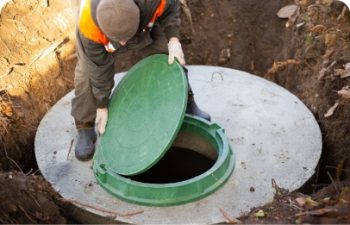
Although your septic tank is buried safely into the ground, it can still be impacted when the temperatures drop. Not only can winter weather contribute to freezing pipes, but even mild temperatures can cause changes in the way your septic system works.
Septic systems rely on a natural bacteria process that can unfortunately be affected by cold weather. When wastewater enters your tank, the healthy anaerobic bacteria of your tank immediately goes to work by eating and digesting the waste. Solid waste then become liquid and gas, which makes up over half of the total decomposition in your septic system.
How does cold weather change this process? When the temperatures drop (even just below 70 degrees), the bacteria slows down their eating process, and this may disrupt the balance of good and bad bacteria in the tank. In addition, your drain field soil is likely to become more compacted during cooler seasons, which can limit its ability to handle or filter as much water. On really cold days, you may also suffer from freezing pipes.
What Do You Need to Do?
Don’t worry. You don’t have to make major adjustments to your septic system every time the temperature drops below 70. However, you should be aware that long periods of cold weather can begin to affect your septic tank operation. Recognizing signs of trouble (foul odors, slow drains and standing water in the drain field) become very important. In addition, routine septic tank maintenance can ensure your tank isn’t failing due to the weather. At Metro Septic, we can monitor the bacteria in your septic tank and keep your system working in top condition through all seasons of the year. Contact our Cartersville septic experts today.

